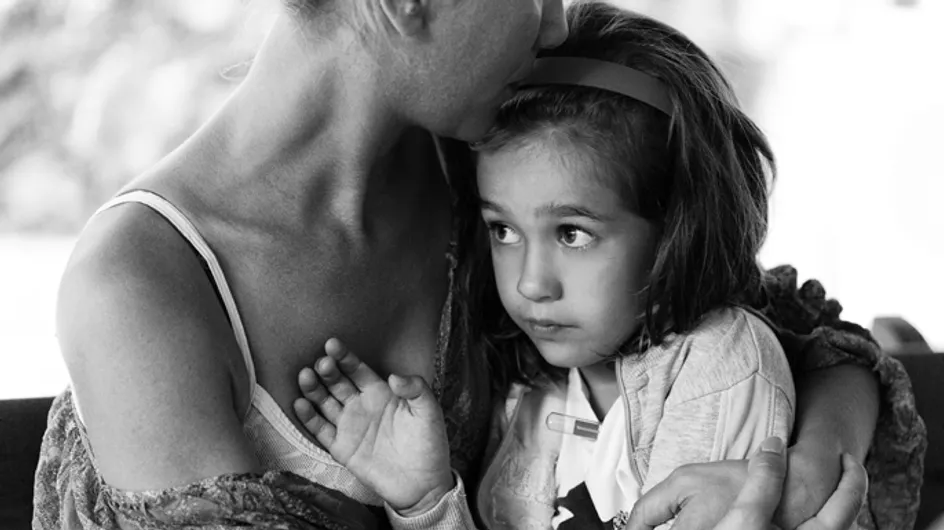One of the most difficult aspects of parenting is figuring out how to effectively teach a child that something she's done is not gonna fly.
For parents with very strong-willed children, being at home can sometimes feel like a power struggle, and instead of losing all control, spanking becomes a way to immediately enforce rules and good behaviour.
We know that spanking has been hotly debated for decades with fierce support from either side - so what's the right option? It's near impossible to tell a well-adjusted person who was spanked as a child and finds nothing wrong with the method that the facts show that children who are spanked on a frequent basis "increases the likelihood of abusing one's own children or spouse as an adult."
When a frequently-spanked child is at risk of future emotional problems, as a parent, sometimes you have to step back and decide if "It worked for me!" is really a good reason for using this method now.
To get some guidance, we spoke again to Clinical Psychologist, Dr. Laura Markham, author of Peaceful Parents, Happy Kids: How to Stop Yelling and Start Connecting and founder of the parenting resource, AhaParenting.
Here's what she had to say.
Spanking does not result in a more obedient child.
"There's one positive outcome of spanking," Dr. Markham begins, "and that's that the child immediately complies with what you're asking because she's afraid." Yes, after a good spanking your child will probably shut her mouth and do everything you instruct her to do in that moment and maybe even weeks after you physically disciplined her.
However, according to Dr. Gershoff's study that obedience erodes over time and is not at all effective as a long-term form of discipline.
Children who are hit, are more likely to hit others.
Dr. Markham continues to warn about the long-term effects detailed in Dr. Gershoff's study: "No question about it - children who are hit are more likely to hit other children, more likely to hit their parents, their siblings. And when they grow up, they're more likely to hit their partners."
Spanking doesn't teach kids self-control.
It only teaches them that a certain behavior will result in violence. In her research, Dr. Gershoff concludes that, "it can be confusing and frightening for children to be hit by someone they love and respect, and on whom they are dependent."
Spanking is an emotional event and a child's feelings of "fear and sadness" as it's happening can obstruct any message you're trying to convey through spanking.
So what to do instead...
Dr. Markham does not believe punishment is an effective way to correct bad behaviour. Instead, she encourages parents to set non-negotiable limits on their children through 'Empathic Limits'.
Now what is Empathic Limits? The term was created by Dr. Markham, but the method, which teaches kids not only to comply but also helps them understand that sometimes they have to "give up something they want for something they want more - a positive relationship with their parents," has been around for awhile.
To give you a clear understanding of how to implement Empathic Limits in every day situations, we've used one of Dr. Markham's examples:
When trying to get a strong-willed child off the swing because it's time to go home and eat dinner, she may fight and scream and make it incredibly difficult for you to get her out of the playground.
In this instance, you as a parent, might match your child's misbehaviour with yelling or even spanking for not listening. Dr. Markham asks parents to "STOP, DROP, AND BREATHE," i.e. calm down, take a few breaths, and then state your non-negotiable limit again.
Parent: Julie, it's time to leave the playground now and go have dinner at home.
Julie: WHY! I don't want to! I want to stay! [cue crying].
The inevitable crying and refusal to listen again often leads to parents resorting to ineffective punishments. However, when the child starts to get upset, according to Dr. Markham, you need to recognise the child's anger and respond to it in an empathic way:
Parent [holds the child]: I know you're upset, Julie. I understand that it's hard to leave when you're having fun.
The empathy parents show toward their children's feelings assures them that they aren't dealing with the sadness and anger of leaving the park all by themselves. Their parents do understand how they feel, and they respect them enough to help them work through the upset.
If a child needs to cry it out, let her. If she doesn't want to be held, don't force a hug, but console her with your words:
Parent: I see you don't want to hug mummy right now because you're sad and you're crying. I'll stay right here with you.
Admittedly, at the beginning, a large degree of patience is required of the parent for Empathic Limits to have a genuine effect on the child. The first time limits are set, children will probably throw fits, which will test parents' ability to stay calm when their children are acting unreasonably. Yet acknowledging their tears in a kind, empathic way instead of yelling doesn't mean the limit disappears or that parents are being pushovers.
When parents stick to their non-negotiable limits, children will become less likely to cause a scene over going to sleep at 8pm when they know that - even after the tantrum is over - their parents will still insist that they go up to their rooms.
As you can probably guess, sticking to the limit is key for Empathic Limits to work. Never compromise on a limit that is important to you as a parent or your child will sense that - with a little push back - you will revoke that limit. Always remember that you're the one in charge, not the child, and you're strong enough to weather whatever hysteria your kid might dissolve into tears once she realises she's not going to get her way.
Some detractors think Empathic Limits is too soft and doesn't show children how their behaviour can be upsetting to others. We say take the longview, and remind yourself what being a parent is all about - teaching children self-control and self-discipline, especially in social interaction, so that bad behaviour isn't an option for them in the future.
And it doesn't hurt that the long-term benefits of Empathic Limits is that older children are able to empathise and compromise with their family and peers...making your job as a parent that much easier.
How do you get your child to listen? Tweet us @sofeminineUK

















